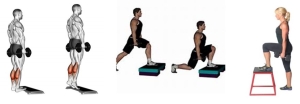Do you check the profile on a run race?
When setting out our training plan for an upcoming running race, after the race length, the next aspect to look at is how flat or hilly the course is; known as the “course profile”. This ultimately helps to tailor your training plan to either have more hill or more flat training, to ensure that we have the right preparation for the course.
How will a hilly run profile affect our strength training plan? Should you do more strength work to compliment a hilly run course?
Ouch…that heavy leg feeling
Many runners have experienced that tired, heavy leg feeling after encountering an unexpected hill upon their run. The common misconception heard is that different muscles are working when tackling these hills. However, the same muscles are working but the loads are either more or less. For example, the load switch we tend to notice in uphill running is a reduction in hamstring and glute activation, with an increased quadricep and calf. This shift in load is commonly noticed the next day due to increased fatigue, requiring longer recovery for those areas.
With knowing the switch in potential muscle activation, we can make suitable changes to our strength plan to compliment the change in training, and ensuring your training is tailored and specific to your target running event.
The changes could come from…
- swopping exercises
- tempo modifications
- increasing sets and reducing reps
- altering rest time between sets
An exercise change could be as easy as adding in inclines to certain exercises, for example a weighted step up or a front foot elevated split squat. Even with the change of adding in more calf and quad work, you should still not neglect other muscle groups such as the hamstrings and glutes, these muscles do not switch off during uphill running, and you don’t want preparation for hills to also take away from your training to run on the flat. So by having an overall strength plan which involves an array of muscles, you’re then able to tweak parts to suit events in your calendar.
For more guidance with your run training, book an appointment with one of our Sports Conditioning Therapists




